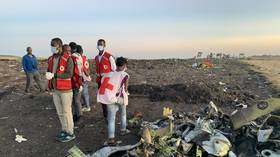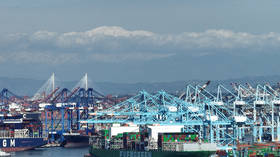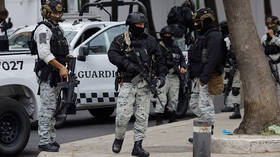Ethiopian Airlines Boeing 737 MAX 8 crash: Questions that remain unanswered

The crash of the 737 MAX 8 jet in Ethiopia has rocked the world and apparently spelled hard times for Boeing. The incident itself – as well as its aftermath – has also raised some questions that need to be answered.
In the wake of the tragedy, the US manufacturer struggles to contain the fallout as more than 40 nations have decided to ground its aircraft following the crash. Meanwhile, an informal consensus is forming around the idea that it is the airliner's flight control software that is highly likely responsible for Sunday's catastrophe.
‘Don’t sink! Don’t sink!’ Pilot reports reveal at least 2 incidents of Boeing 737 MAX 8 nosedivinghttps://t.co/v7S2BPOACGpic.twitter.com/jBeSAfU1As
— RT (@RT_com) 15 марта 2019 г.
The media are increasingly reporting about the similarities between the Ethiopian crash and the one that occurred in Indonesia less than six months ago and also involved a 737 MAX 8 model. Some other reports have revealed that pilots flying the troubled series have also repeatedly complained about the planes’ autopilot making it nosedive and lose altitude on several occasions.
Most recently, it was reported that a jet piece found at the Ethiopian crash site indicated that the airliner was set to dive before the catastrophe happened.
Also on rt.com Boeing pledges to roll out software upgrade for 737 MAX in ‘coming weeks’ after FAA pushThe reaction of Boeing, which recently vowed to upgrade its software for the 737 MAX series, also indicates that the jets do have a problem with software. However, as the world tries to figure out what exactly happened there still seems to be more questions than answers.
What has gone wrong?
While it increasingly seems that it is one of the flight control systems known as Maneuvering Characteristics Augmentation System (MCAS) that is the most likely culprit behind both the Ethiopian and the Indonesian incidents, it still remains unclear what exactly caused both crashes.
The system was designed specifically to prevent the new aircraft from stalling and eventually falling, but it seems that it did quite the opposite. The jets were equipped with some new engines, which could possibly prompt the plane to climb too high too soon and eventually stall, independent international affairs and aerospace industry analyst Alessandro Bruno explained.
Also on rt.com FAA says ‘months’ needed to fix Boeing 737 MAX software, not sure how long grounding lastsTo avoid this, Boeing has programmed flight control computers to stabilize the aircraft's nose, Bruno told RT. However, due to some malfunction, this somehow forced the aircraft to nosedive under certain circumstances.
The pilots, in turn, were apparently sometimes unable to correct this AI failure due to what is now called an “inadequate and almost criminally insufficient” flight manual, which barely mentioned the new system and only did so on some of the last pages, according to the analyst.
The incident shows the limitations of artificial intelligence in vehicles. Older versions of 737 would have never had such problems because there was nothing wrong mechanically with the airplane, it was an electronic problem, a software problem and the problem of awareness.
Did Boeing know about this issue?
Even if the existence of such a problem was not clear from the very beginning, the first fatal crash involving a 737 MAX in Indonesia should have certainly rung an alarm bell. And it apparently did.
Boeing did issue a warning and a training advisory to all 737 MAX operators, urging them to avoid letting the MCAS send the plane into a nosedive. However, it also clearly hesitated to investigate the matter further and also defended the manual by saying that it describes the MCAS as a “relevant” function.
Why did Boeing let it happen?
If one assumes that the company knew about the problem long ago, then this question really becomes one of the most pressing ones. One possible answer might be that the silence was all about quick profit.
Boeing's non-reaction to obvious risks 'shows an awkward view on its responsibility vis-a-vis the public'https://t.co/MijI3qu5YG
— RT (@RT_com) 14 марта 2019 г.
The 737 MAX series was allegedly designed too quickly and rushed into production to let Boeing catch up with its major competitor – Airbus – which has recently developed its own new A320 Neo airliners, Bruno said. However, it also faced another problem – that the pilots had to be re-certified to fly the new models. And, in order to do that, they had to be retrained first.
We marked the countries red that have banned the new fancy Boeing 737 MAX. That. Is. A. Lot. Of. COUNTRIES! pic.twitter.com/I1jx6xYGWx
— RT (@RT_com) 13 марта 2019 г.
The need for retraining could have discouraged the airlines from buying the new model and eventually stall its entry into the market, the analyst believes.
“The big problem here was that they actually hid this system in order to bypass flight regulations,” he told RT.
What they did in order to get those planes sold quickly is that they decided to hide some of the changes to tell the customers that the new planes are exactly the same as the older ones and do not need pilot re-certification.
As a result, the pilots might have not received a proper training to deal with the new system, which was introduced precisely because some flight characteristics of the planes changed due to the new engines. It is yet to be determined if it is the issue of awareness that is at heart of both tragic events, though.
Why did Ethiopia trust France to work with black boxes?
At first glance, it would seem only logical for Ethiopia to let the US aviation experts to work with the black boxes of the crashed 737 MAX. After all, Boeing is a US company and they would be expected to be best poised to investigate any issues related to its planes.
Also on rt.com Countries that did & DID NOT ground Boeing 737 MAX 8 amid probe; BILLIONS at stakeNot quite so, Bruno believes. The Ethiopian authorities might have suspected that the US analysts could be biased in favor of the aircraft manufacturer and blame the crash on a pilot error, which is a quite common reason for such incidents. France, which hosts the headquarters of the Boeing competitor Airbus and has quite experienced professionals in this field, might have been viewed as a more neutral option in this case, the analyst believes.
Some aviation specialists familiar with the issue also told RT that the Ethiopians initially addressed the Germans over this issue but were re-directed to France. It might also be simply a matter of convenience or timing as France is geographically closer to Ethiopia than the US.
Why was US last to ground troubled aircraft?
Two fatal incidents involving the 737 MAX in less than six months have certainly unsettled the international community and prompted many nations to ground the troubled series. Boeing's home country was among the last to do so, however.
Such behavior might have a number of reasons, both economic and political. The US Federal Aviation Administration (FAA) might also be implicated in this mess to a certain extent. After all, it was the FAA that approved the new 737 MAX series, despite all the problems with the MCAS and the flight manuals. It could have understandably been reluctant to admit its failure.
Also on rt.com Boeing stock drops most in two decades after 2nd crash of its popular 737 passenger jetBesides, Boeing is one of the US' major exporters, with civilian aircraft and aircraft engines being at the top of the US exports list. Back in 2018, CNN even called Boeing “the nations’ largest single exporter.”
The company is highly likely to face serious troubles, which could range from customers cancelling contracts to even its investors suing the company over keeping them in the dark about the potential problems with the 737 MAX series.
“Its downfall could hit the US economy really big, it could affect stock markets in the US,” Bruno said.
Apart from spelling economic trouble, the scandal around Boeing might also harm Washington politically. China is one of the company’s major customers, and its airlines had ordered 180 jets from the 737 MAX family, but less than half of them have been delivered so far. Now, Beijing would have a legitimate reason to review and even cancel these contracts, which could put the US in a bind in trade talks with China.
Also on rt.com Boeing halts 737 MAX deliveries amid fallout after deadly Ethiopian crashIt would be hard for Washington to exact concessions from Beijing when the fate of its major exporter’s contracts in China is in limbo.
The exact reasons of the Ethiopian crash are yet to be determined, as are the actions of Boeing and all relevant authorities and businesses that might have led to this tragic turn of events. One cannot say if we will ever get to the bottom of it, but it seems pretty clear that Boeing now has a lot of damage control to do to contain the fallout.
And it may well turn out that Boeing has only itself to blame.
Subscribe to RT newsletter to get stories the mainstream media won’t tell you.













